 |
| Wikipedia Commons |
She kept her word. On Sunday she took a seat at the back of the building. We had always sat together on the platform until that day. So the contest had begun right in the church.
A collection of interesting Christian stories, and Biblical doctrine. This blog has been BANNED by Facebook for unknown reasons.
 |
| Wikipedia Commons |
Undoubtedly one of the greatest ambassadors of Jesus Christ ever to set foot in Tibet was the American Pentecostal missionary Victor Plymire, who was born in Pennsylvania on January 10, 1881.
As a newborn baby he fell seriously ill, and was at death's door for many hours. A doctor was summoned, and he declared there was no way the child's life could be spared. Plymire's mother, Laura, carried her little son's limp body into the bedroom and closed the door. She laid Victor on the bed and cried out to the Living God for mercy, making a covenant with the Lord that if He would heal the boy, the rest of his life would be dedicated wholly to God's service. The color returned to the baby's face and within days he had returned to normal.
When he was 16, Plymire committed his life to God after hearing the gospel at a street meeting. He became a preacher with the Gospel Herald Society and led several churches in his home state.
After being sure the Holy Spirit was calling him to overseas service, Plymire applied to join the Christian and Missionary Alliance. He was promised a monthly allowance of $25, and departed the United States for China in February 1908, sharing his cabin with another new recruit, Ivan Kauffman.
After months of travel, Plymire arrived at the town of Lintan in Gansu Province, which was to be his new home base. His first concern was to study the Amdo language, and to get to know the local people and their customs. The new missionary soon discovered it would be no easy task, however, for the locals had been threatened with severe punishment if they taught their language to the white man.
Undeterred, Plymire rode his horse for two days until he came across an old Tibetan man with a large sword dangling at his side, who agreed to tutor the missionary. The teacher had a rugged look and sported scars across his face from past battles. God placed his favor on their friendship, however, and their bond proved invaluable, as Plymire gradually acquired the Amdo language.
One day, Plymire told his tutor that he was leaving the next day to visit a nomadic area further west. The battle-scarred man drew Plymire close and whispered: "I am the leader of a robber band which hides out along the route you wish to follow. If you insist on going so soon, it will be fortunate for you if you ever come back alive. If you will wait, I will send word to my men so that they will not harm you as you pass by."[i]
Although he loved being among the Tibetans, Plymire struggled with loneliness, and was thrilled to announce his engagement to fellow missionary Grace Harkless in 1914. Numerous obstacles and delays stood in their way however, and five years elapsed before their wedding finally took place on New Year's Day, 1919.
Although they loved each other's company, Victor and Grace felt isolated in their work, and they often cried out in prayer for God to send co-laborers to join them. Few Christians, however, showed any interest in serving in such a remote and dangerous part of the world.
By 1920, the Plymires felt a need for more spiritual power in their witness to the Tibetan people. Although Victor had faithfully served the Lord for years, he knew a dramatic change was required if the gospel was ever to be widely believed among the thousands of towns and villages where Christ had yet to be named.
While on furlough back in America, the Plymire's attended a Pentecostal meeting and were baptized in the Holy Spirit. This experience made their positions untenable with the conservative CMA, so they resigned from the organization and Victor and Grace joined the Assemblies of God.
The Plymire family entered the most fruitful season in their ministry after their return to Tibet in 1922. From their new base at Tangar (now Huangyuan in Qinghai Province), they established an Assemblies of God mission station. They also entered into a deeper consecration in their walk with God at this time, and when they found it would cost $6,000 to build the mission base, the Holy Spirit urged them to liquidate all their possessions to finance the construction. Victor surrendered all the savings he had, while Grace used the inheritance she had received prior to their marriage. God honored their sacrifice, and the new church and mission center were opened at Tangar.
The Plymire's continued to trust God for a breakthrough, and in 1924, after 16 long years of labor, Victor baptized his first Tibetan convert: a woman who was married to a Han Chinese man. Her journey to salvation began after her husband attended a church service and became a Christian. This caused her to fly into a rage and threaten to kill him if he didn't recant. Her brother, a Buddhist lama, encouraged her to do everything to destroy her husband's faith, but he remained steadfast in his commitment to Jesus Christ.
One day the Tibetan woman yielded herself to the devil in such a way that she became demon-possessed. Her behavior was so violent that the lamas were called in to chant over her in a bid to exorcise the evil spirits, but she only seemed to get worse. The next day the Plymire's visited the family, only to find the woman lying on the floor in a trance. They immediately entered into spiritual battle for her soul, as a group of terrified relatives looked on.
When Victor shouted, "In the Name of Jesus, I command you, evil spirit, to leave!" the woman was instantly released from her torment. The shocked onlookers said that "they saw a loathsome, beast-like creature come out of the woman on the floor. One bystander in the doorway was knocked down as the demon left the place! Again Christ had triumphed. The Tibetan woman was now free—and converted at the same moment!"[v]
As 1927 commenced, the Plymires were more excited about prospects for ministry among the Tibetans than ever before, but their plans were soon in tatters. In the first week of January, a Tangar resident died of smallpox, and within a few days several more people had perished. On the evening of January 9, five-year-old John Plymire suddenly became ill with an intense fever. His parents cried out for God's deliverance, but the Creator had other plans. Victor later wrote to his sister in America:
"We were always comforted in prayer, but the sickness did not leave him. On the third day the smallpox appeared, turning dark almost immediately. We prayed so earnestly for the dear little boy—but Jesus wanted him. During the first seven days of the child's illness my dear wife never spared herself. We prayed together. On the seventh day she had to give up: the smallpox had broken out on her also....
On January 20, at 8:30 in the morning, Jesus took our boy to be with Him.... In soft, sweet whispers, before he went to be with Jesus, he told me he loved Him. A little later he said softly, 'Daddy, Jesus loves me. I have no more pain'. This was the last he said—then he was gone."[vii]
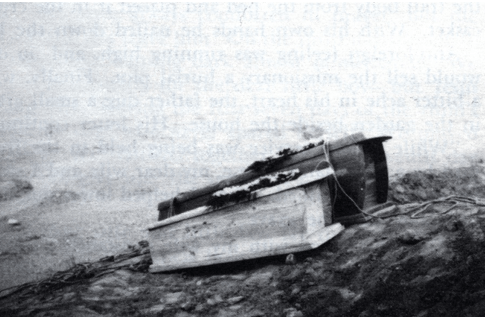
The coffins of Grace and John Plymire, buried on a remote hillside. [David V. Plymire]
With tears streaming down his cheeks, Victor placed John in a small wooden casket and nailed down the lid. Despite her body being wracked with pain, Grace attended the funeral service.
A further week passed until the morning of January 27, when Victor and Grace read together from the Bible and sang their last hymn together. Victor recalled: "She asked me to help her to sit up. For a very short time she rested in this position, then she began to sing in such sweet tones, 'Jesus is Coming for Me.' Then her head fell against my right arm. The very dearest on earth to me had gone to be with Jesus."[viii]
Victor Plymire, with a heavy heart, also nailed down the lid of his beloved wife's coffin, as an awful sense of loneliness and despair wracked his soul. The next morning a Chinese friend offered a plot on the outskirts of Tangar. When Victor went to dig the two graves, however, the frozen ground proved almost impossible to penetrate, and it was decided to place both coffins in the same grave. The agony felt by the dedicated missionary comes through in this letter he wrote to his relatives back home:
"On January 29th I followed my two loved ones to this lonely spot on the Tibetan mountains. My dear wife and little boy were placed in one grave. Why these dear ones were called away I do not know. I do not question. They were so earnest in trying to evangelize this vast region....
It is so very hard in the natural: now entirely alone. For several years we prayed for help.... We begged for someone to help my wife in the work and to be a companion while I was out among the Tibetans. But no one came. Has someone failed God?"[ix]
Victor Plymire soldiered on in his isolated corner of the Tibetan Plateau. The deaths of his cherished ones made eternity even more real to him, and he was more determined than ever to share the gospel as widely as possible. An even greater intensity came over Plymire when he was told that the volatile political situation in China meant all missionaries might soon be ordered to leave the country and never return.
Motivated by a new sense of urgency, he launched preparations for a daring undertaking—he would take the gospel across the entire Tibetan Plateau, and would preach Jesus Christ in Lhasa, the forbidden stronghold of Buddhism, before crossing the Himalayas into India.
Plymire knew that many Evangelical missionaries had failed in their attempts to enter Lhasa, and he was acutely aware that many had perished while trying to fulfil the dream. He was not put off by the challenge, however. Even if the endeavour would cost his life, Victor no longer put his hope in this world. He was willing to die in the pursuit of lost Tibetans.
Although for years Plymire had suffered a great deal from rheumatism, he pressed ahead with plans for the gruelling expedition. He purchased 47 hardy yaks to carry Tibetan Bibles, 74,000 gospel booklets, and 40,000 simple gospel tracts. Finally, a supply of food was carefully measured out to last the duration of the journey for himself and his colleagues. Five 100 pound (45 kg) bags of roasted barley flour were purchased, and packed along with 75 pounds (34 kg) of yak butter. Strips of dried meat were stuffed into sacks together with dried fruit and vegetables, and a pound of American candy.
On the eve of his departure into the unknown, Victor once again visited the grave of his wife and son. He had a quiet word with his Lord and Savior, and his journey commenced on the morning of May 18, 1927, accompanied by two Tibetans and three Chinese helpers. As they rode to the west, the small town of Tangar soon faded into the distance until it was out of sight. On the first day, five Tibetan families were presented with the good news of Jesus Christ.
The reality of the challenges ahead came into focus on the second day, when several of the yaks collapsed from exhaustion as they crossed a snow-bound pass at 13,000 feet (3,960 meter) above sea-level. Despite the challenges, Plymire went to sleep happy that night, for six more Tibetan families had received a gospel witness.
Early the next morning the men were jolted awake with a severe rumbling. It seemed as if even nature itself was conspiring against the expedition, as a strong earthquake shook the ground. Plymire ordered the party to get up and advance. They found grass for the yaks to graze, and rested for a few days while the tired animals were traded for stronger ones. Victor took advantage of the break to write to his parents:
"This will likely be my last letter till I reach India.... Thus far the Lord has blessed me. I am troubled with rheumatism but God has wonderfully helped me.... We have already been delayed beyond my plans, and our food supplies may run short.... I have tried to give the gospel so that all may hear it at least once."[x]
The letter, dated June 5, 1927, took eight months to reach his parents in the United States. During that time nobody knew if Victor Plymire was dead or alive. Many assumed he had perished like so many other missionaries before him. All records of the remainder of the journey came from Plymire's personal journal, and from the trusty camera he took with him wherever he went.
Much of Plymire's journey from this point on was across the vast, unexplored expanse of central Tibet, through regions that remained blank spots on maps of the world at the time. After struggling to cross a desert that was inhabited only by a few Mongols living in tents, neither men nor animals had a sip of water for a full day, and three of the yaks dropped dead from exhaustion. Plymire rode on ahead of the group, and when he came to a stagnant pool covered in scum and mosquitoes, in desperation he got down on his hands and knees and drank deeply to relieve his thirst.
Next, they soldiered on across a barren, wind-swept 250 mile (402 km) plain, when one of the horses suddenly fell into a bog and sank in up to its bridle. Plymire couldn't afford to lose a horse, and he eventually extracted it from the miry pit after much effort.
Although many people have seen Tibetan yaks, few are aware of the massive size and danger posed by wild yaks on the plateau. Standing 6 feet (1.8 meters) at the shoulder and weighing over 2,000 pounds (907 kg), these impressive beasts can easily kill a human being.
Plymire set out to shoot a wild yak so that his men could eat fresh meat, but when he opened fire and missed, the yak came thundering toward his assistants. Fumbling desperately, "Plymire managed to get a cartridge in place and pulled the trigger. If he missed this time, the game would be up. The badly frightened men watched as the huge animal came to a halt only 50 yards from them—and fell dead."[ii]
For weeks Plymire and his colleagues continued to inch their way across the Tibetan wilderness toward Lhasa, while leaving a gospel witness with every person they met along the way.
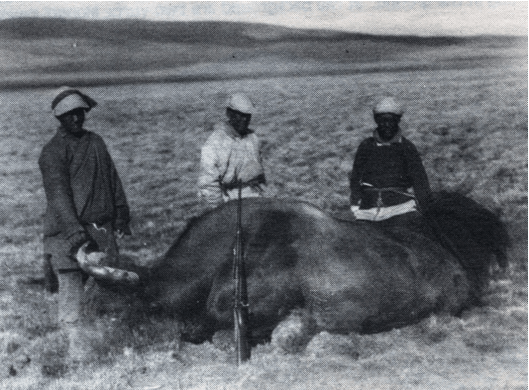
Plymire's men standing over the wild yak that attacked them.
As Plymire's group slowly pushed on through the huge Ngari region of northern Tibet, a man rode into their camp and demanded to speak privately with the missionary. He informed him that a local chief named Goma Kushuk was aware that they had entered his territory and was sending some of his men to kill them. Plymire discerned that the man was telling the truth, and he dropped to his knees in fervent prayer.
The next morning Plymire set out with his two trusted Tibetan friends, No Ga and Ka Zong, and discovered that the chief had already convened a "council of death," and that a letter the missionary had written to the Dalai Lama in Lhasa had not been sent on. By destroying the letter, the chief planned to murder Plymire and his men without the authorities in Lhasa having any knowledge of their intended journey.
God was at work behind the scenes, however, and the Dalai Lama heard about the group from a trader who announced that a white man was approaching the capital. The Dalai Lama immediately wrote a letter to Goma Kushuk, reprimanding him for not informing the palace of the men's journey, and warning him that if any harm came to the group then the chief would be executed. A runner departed Lhasa with the letter at the same time that Plymire and his men entered the village of Shidapen Gonpa to meet the bloodthirsty chief.
As Plymire and his colleagues arrived, crowds of onlookers watched in silence, aware that the visitors would soon be executed. The men were ushered into a large council tent, where Goma Kushuk stood with three bodyguards, each brandishing a sword.
The missionary's Tibetan helpers were immediately sentenced to death, and berated by the chief for having the audacity to guide a white man into the forbidden land. Plymire, realizing his own life would not be spared, pleaded for mercy for his Tibetan friends, which only seemed to infuriate the chief even more.
Meanwhile as the runner approached Shidapen Gonpa with the letter from the Dalai Lama tucked in his coat, the Holy Spirit woke an elderly intercessor on the other side of the world in Olympia, Washington. A sense of urgency overwhelmed her, and the Holy Spirit suddenly gave her a striking vision of a group of men gathered together in a tent. As she studied the strange men intently, wondering what the vision meant, she recognized the white man as a young missionary she had once heard speak in a church service. He was going to Tibet, and she had prayed for him many times without knowing what happened to him.
Although the intercessor couldn't remember the man's name, the Holy Spirit whispered to her, "Pray for Mr. Plymire. His life is in great danger." She immediately cried out fervently, asking the Lord Jesus Christ to intervene and spare the lives of Plymire and his co-workers.
Back on the Roof of the World, Plymire's protests were dismissed, and Goma Kushuk announced his verdict: "Cut off the heads of all three!"
No Ga and Ka Zong were to be killed first, and the white man last. The three bodyguards moved toward the prisoners, who were bound on the floor. At the exact moment the executioners raised their swords to carry out their orders, the runner from Lhasa arrived!
"He rushed into the tent and snatched the letter from his garment, and presented it to the chief. There was heavy silence in the tent as Goma Kushuk slowly opened the letter and studied its contents. As he read, Plymire noticed the proud look on the man's face change to one of consternation. Attempting to appear unshaken before his men, the chief continued with the letter until he had finished.
It was indeed an embarrassing situation for him. If he permitted the executions to go ahead as ordered, it would be only a matter of time until he himself would suffer the same fate. But if he obeyed his superior's orders he would be making a fool of himself.
Deciding that embarrassment was preferable to death, he gruffly addressed the guards: 'Release the white man and his two helpers! There will be no execution!'"[xii]
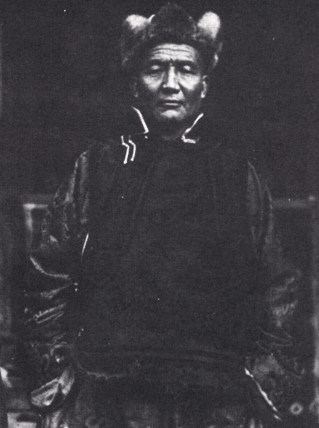
Goma Kushuk, the chief who attempted to kill Plymire and his men.
In Washington, the elderly intercessor received assurance that her prayers had been answered. Months passed before Plymire received a letter from her, telling of her intense experience. She described the vision and even included a sketch of what she had seen, including the positions of all the men in the tent. She even accurately described the clothing each man was wearing. Plymire remarked: "If a photographer had been present he could not have made a more accurate picture of the situation."
The relieved men returned to their camp with songs of praise on their lips. They knew their lives had just been spared by the supernatural intervention of the Almighty God.
After their near-death experience, Plymire realized there was no way his caravan of men and animals could reach Lhasa without further incident. The helpers were ordered to retrace their steps back to the Amdo region, but the American would not be deterred in his attempt to become the first Evangelical missionary to set foot in Lhasa.
In later years, Plymire refused to confirm or deny if he had successfully reached his desired destination. When asked, he would always say: "I cannot tell. The men who were my guides might suffer if I told."
What is known is that Victor Plymire said farewell to his colleagues, disguised himself as a pilgrim, and headed toward Lhasa along a little-known trail through the mountains to the north of the city.
After leaving Tibet, Plymire wrote a letter to his mother in which he mentioned he was just 15 miles (24 km) from Lhasa, and shortly before his death he told his daughter Mary: "From where I stood I could see the golden palace roof shining in the sun." He also had in his possession a photograph and negative of the Potala Palace in Lhasa.
Before he commenced the long journey months earlier, Plymire had carefully arranged a collection of special gospel materials which he was determined to present personally to the Dalai Lama. He returned without the package. In one of his last diary entries, the pioneer wrote: "The most interesting part of my trip...must remain a secret. Suffice it to say that I carried the gospel where no other had ever been able to go."[xiii]
After his intriguing detour, Plymire caught up with his men and supplies. They took a route further west than the one they had come by, passing through the town of Gar, not far from where the Catholic missionary Antonio de Andrade had established a church with the blessings of the king of Guge more than three centuries earlier.
Despite nearly losing his feet to frostbite on the homeward journey, the courageous American stumbled on, still pained by severe rheumatism. Finally on February 26, 1928—after walking or riding nearly 2,000 miles (3,240 km) across the most inhospitable landscape on earth—Plymire led his triumphant group across the border into India, where they distributed the last of their Tibetan literature. After traveling for nine months and eight days, the exhausted apostle wrote:
"We were able, with the help and guidance of the Lord, to give the gospel to Tibetans from one end of the country to the other—from the extreme northeast down into the very heart of the country and on through western Tibet. The headman of each district through which we passed was given a New Testament. For all this I praise God. This was the object of our venture."[ii]
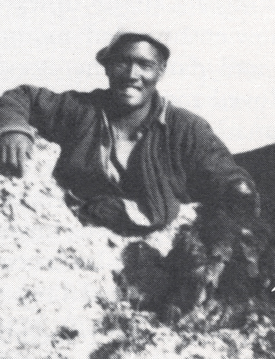
No Ga, a Tibetan martyr for Christ.
At the start of the journey, Plymire's Tibetan guide No Ga had been sympathetic to Christianity but remained unconverted. After personally witnessing God's mighty power, however, No Ga bowed his knee and dedicated his life to Jesus.
When No Ga's family heard about his conversion they were infuriated, but none of their threats of violence moved him, and he remained a faithful follower of Christ.
A number of years later, the elders of his village constructed a shrine atop a mountain, in order to placate a deity. No Ga explained that as a Christian, his beliefs did not allow him to assist with the project. The elders were furious, claiming that his decision had angered the gods and they would not be held responsible for whatever fate befell him.
When his own brother-in-law threatened to kill him if he would not participate in the building of the shrine, No Ga replied: "I am not afraid. I know Jesus will be with me."[xv] Several days later his brother-in-law left the village and was seen buying a packet of poison from a store. That evening,
"He called on No Ga and...prepared a bowl of hot tea. He drew the packet from the fold of his garment and emptied the contents into the tea. Then he brought the deadly liquid to No Ga. The unsuspecting man thanked his brother-in-law and drank every drop.
In a few moments faithful No Ga lay still in death. He had paid the supreme price for his faith in Christ. Were human eyes capable of beholding the invisible, they might have seen the soul of No Ga, the Tibetan Christian, taking its flight upward past the hills and above the snow-enshrouded mountains. Now, beyond all suffering and danger, he stood in the presence of the One he loved more than life itself. And he could stand there unashamed, for he had been faithful unto death."[xvi]
Wracked with guilt, No Ga's brother-in-law confessed to what he had done, although he refused to accept Christ. A short time later he was afflicted with severe pain. On the gruesome night of his death, "those standing about the dying man claim that they heard demons pounding on the window. Mysterious voices called out of the darkness: 'We have come to take you to hell!' With a wild scream the wretched man, now in the very clutches of Satan, went out into everlasting darkness."[xvii]
As he recovered from his arduous journey, the 47-year-old Plymire contemplated what God might have planned for him. Although his strength was diminished, he still yearned to share the gospel with all Tibetan people. After leaving India and returning to China, Victor renewed his acquaintance with Ruth Wiedman, a missionary who was studying Chinese at the time. They were married in August 1928, and left for Tangar a few weeks later.
The church at Tangar continued to prosper, with four new converts baptized on Christmas Day, 1929, while the following March another 24 believers were baptized.
Decades of exertion had taken a toll on Victor's body, however, and in 1930 he suffered a heart attack. His condition was critical, but the believers at Tangar immediately prayed with all their hearts for their beloved pastor, and God once again spared His servant's life. When he was strong enough to travel, the Plymire's left for the United States for a period of rest and recovery. To the surprise of many, they returned to Tibet three years later, and recommenced the work God had called them to do.
The years rolled on, until Ruth Plymire also suffered a heart attack in 1943. It was decided that she and the children should return to the United States, while the intrepid Victor, now in his sixties, remained on the mission field.
In the summer of 1948, the veteran pioneer William W. Simpson—who was then 78—visited Tangar and held a series of revival meetings. The Spirit of God moved on the people, and many hearts reached out to embrace Jesus Christ. The visitation of the Holy Spirit caused a rapid increase in the number of believers in the town, and soon the church boasted 250 members. Although most of them were Han Chinese, a significant number of zealous Tibetan Christians also attended.
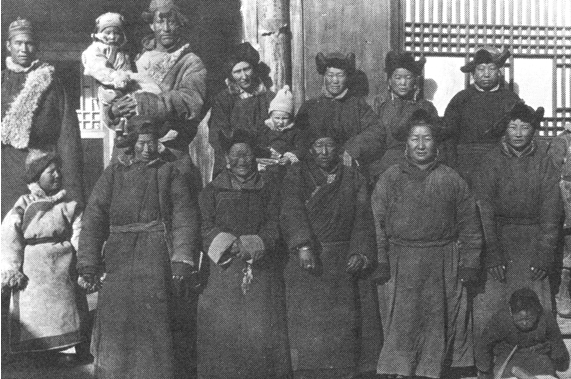
Tibetan believers at the Tangar church.
In 1949, it became apparent that the Communists would soon seize total control of the country, and missionaries would not be welcome in the new China. In April that year, Victor Plymire set out on his final evangelistic tour. He met an old Tibetan pilgrim, and tried to share the gospel with him.. After listening intently, the man suddenly shook his head and said, "I cannot comprehend. I cannot understand. My mind is too old and dark. Had someone told me this when I was younger, I believe I could have understood. But now I am old. It is of no use for you to tell me anymore."[xvii]
Plymire was heart-struck by the pilgrim's reply. To him, the man's words represented a cry emanating from the entire Tibetan race. If only more workers had come to shine the light of God's love in Tibet.
Realizing that the new political situation in China meant he could no longer remain in the place he loved, the spiritual warrior made his way back to the United States, leaving behind a flourishing fellowship, and multitudes of Tibetans who had heard the gospel during his 41 years of faithful and courageous service.
The Plymires settled down in Springfield, Missouri, where Victor worked for the Assemblies of God mission board. He continued to preach in churches, and never tired of presenting the needs of his beloved Tibet to everyone who would listen.
One of the greatest Tibet missionaries had completed his race, and Victor Plymire went to his eternal reward in December 1956, at the age of 75.
William James Roop